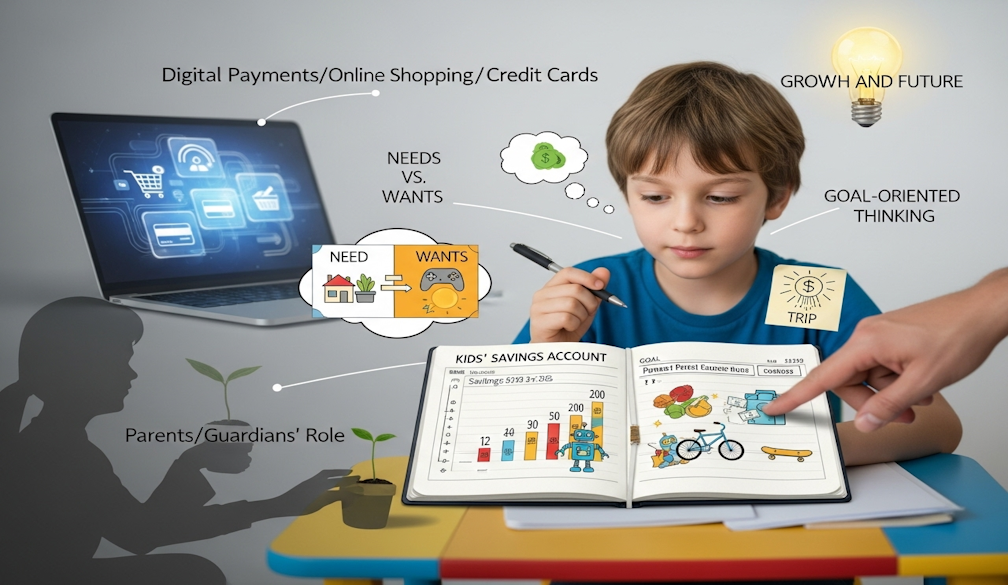The Importance of Financial Literacy from an Early Age

In a world where digital payments, online shopping, and credit cards have become part of daily life, teaching children about money has never been more important. Financial literacy, the ability to understand and manage personal finances, is a crucial life skill that lays the foundation for independence and long-term security. Developing this knowledge from an early age helps children form healthy financial habits that can last a lifetime.
One of the simplest and most effective ways to start is by opening a kids savings account and using it as a tool for hands-on learning.
Building Healthy Money Habits Early
Children often learn by observation. From an early age, they watch how parents and carers handle money, whether it’s shopping, budgeting, or saving. By introducing structured lessons about money management during childhood, parents can help children form positive habits before poor ones take root.
Even basic concepts, such as setting aside a portion of pocket money for savings or differentiating between “needs” and “wants,” can teach valuable lessons about discipline and delayed gratification. A savings account dedicated to children provides a tangible way for them to see their money grow, helping them understand the rewards of consistent saving.
The Role of a Kids Savings Account
Opening a kids savings account is a simple yet powerful step towards financial education. Unlike a jar on the kitchen bench, a savings account allows children to experience how real banking works. They can learn how to make deposits, track interest, and see their balance increase over time.
This hands-on experience helps children connect abstract ideas about money to real-world outcomes. Watching their savings accumulate reinforces the value of patience and persistence. It also introduces them to responsible financial behaviour, including the importance of security, record-keeping, and goal setting.
In addition, involving children in discussions about their account such as reviewing statements or setting savings goals gives them a sense of ownership. It empowers them to take an active role in managing their finances, which can lead to greater confidence later in life.
Encouraging Goal-Oriented Thinking
One of the best ways to engage children with saving is through goals. Whether they’re saving for a new toy, a bike, or a special outing, having a clear target teaches focus and responsibility. Parents can encourage their children to break larger goals into smaller milestones, helping them learn how planning and persistence pay off.
A kids savings account offers a safe space to practise this mindset. By setting regular savings goals and tracking progress, children learn how to make informed choices about spending and saving skills that are invaluable as they grow older.
Laying the Groundwork for Financial Responsibility
Financial literacy isn’t just about numbers; it’s about understanding the consequences of financial decisions. Teaching children about budgeting, interest, and the difference between saving and borrowing helps them build a realistic view of money management.
Starting early also reduces the risk of financial mistakes later in life. When children become young adults, they’ll already have experience with banking and a practical understanding of saving, spending, and planning for the future. This knowledge can prevent common pitfalls, such as excessive debt or impulsive spending.
Involving Schools and Families
While financial literacy often starts at home, schools also play an important role. Many education programs now include lessons on budgeting, saving, and smart consumer choices. When combined with practical experiences like managing a savings account, these lessons reinforce each other and deepen a child’s understanding.
Parents and caregivers can build on this by discussing money openly at home. Simple conversations about everyday purchases or bills can help children understand how money flows and how important it is to manage it wisely.
Preparing for a Financially Confident Future
Financial literacy is more than just a practical skill, it's a form of empowerment. When children learn how to manage money early, they develop confidence in their ability to make sound financial decisions. This confidence often extends into other areas of life, encouraging independence, responsibility, and self-reliance.
Opening a kids savings account is a small but significant step in that journey. It gives children the tools and experience to take charge of their financial future, a gift that will continue to benefit them well into adulthood.
Final Thoughts
In today’s fast-changing financial world, understanding money is as important as learning to read or write. By teaching children about saving, budgeting, and goal setting, we equip them with skills that will serve them for life. Starting early, with simple tools like a savings account, helps children build a strong foundation for financial confidence and success.

















